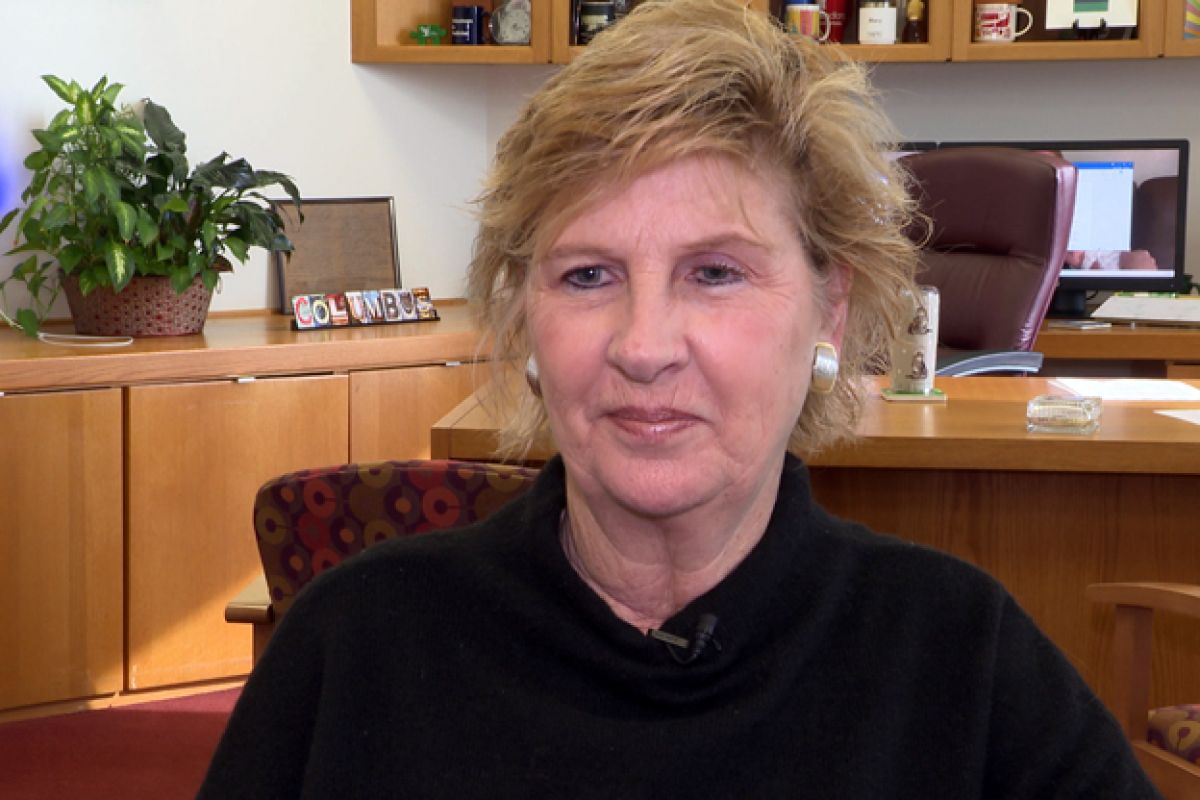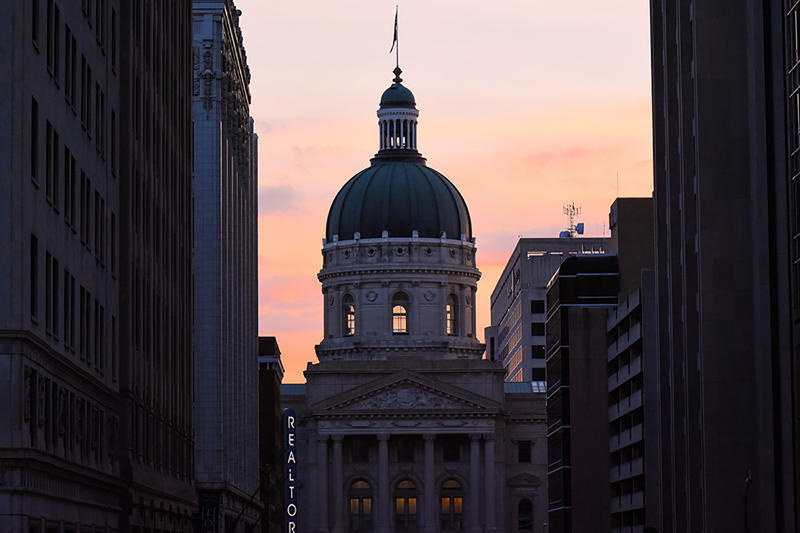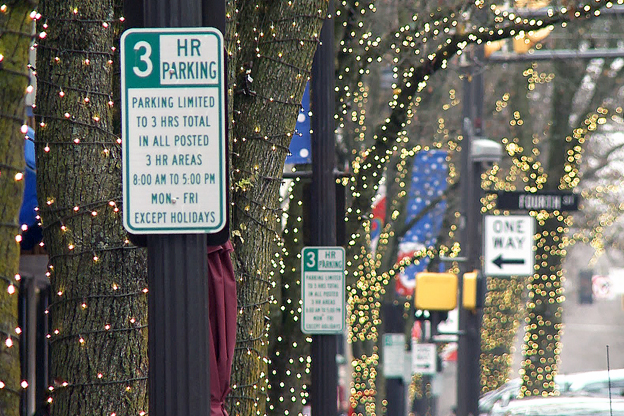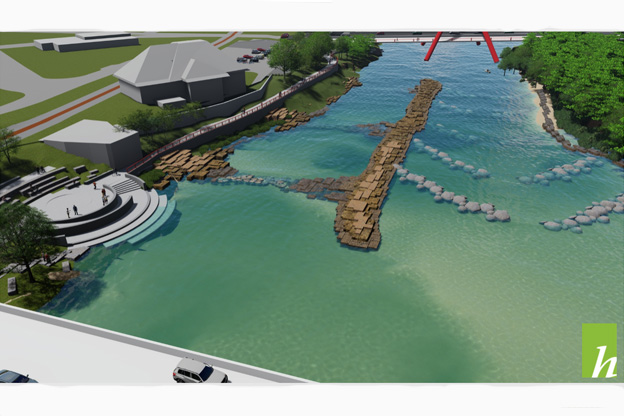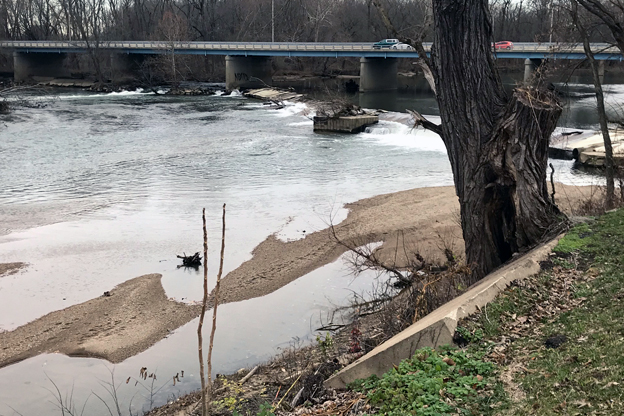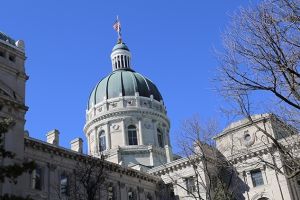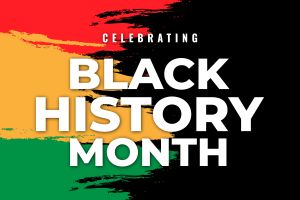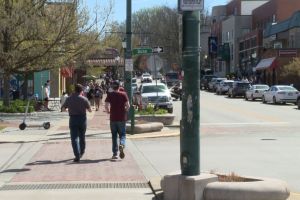Hren >> All right, hello and welcome to ask the mayor on WFIU. I'm Joe Hren. We're in Columbus with Mayor Mary Ferdon. Hello, welcome. Thanks for being on the show.
Ferdon >> Thank you, and it's great to have you here. As you just noted that this is the first time you're here in 2025.
Hren >> It looks great! What did you do to the place?
Ferdon >> Well, a little bit a little bit of warm weather, a little bit of sun, and we got rid of all that snow.
Hren >> Yeah, and that's the reason why I wasn't here in person last month. We just had a long weekend of a lot of snow and ice. And I was like I don't know if it's worth driving all the way there and back during that, but it sounds like you got through it okay?
Ferdon >> We did great, great job by our department Public Works, our transportation folks. But it's interesting because that was about a month ago, and it's taken almost that length of time to get rid of the snow. So, that's more than we've seen for a while. I think the same as in Bloomington.
Hren >> Yeah, yeah. Yesterday helped a lot.
Ferdon >> Yes, it did.
Hren >> Back to some cool weather. We'll see. You know, we've had snow in March, so we're not out of the woods yet.
Ferdon >> That's right.
Hren >> Did you have to order more salt?
Ferdon >> No, we're still pretty good.
Hren >> Still good? Wow, okay. Let's just move to what's going on right now. Overall, it's, it's been kind of a whirlwind, especially news with what's going on on the federal level, your reaction to the executive orders, you know, the President Trump asking to fund, to freeze federal funds and grants. There's immigration. And I know a local church here we just covered, had a what you need to know, for migrants and things like that, I know I'm throwing a lot at you, but I'm not sure what angle to come at you as the mayor of Columbus.
Ferdon >> Well, no, there are. You're right. It's been a chaotic couple of weeks since, you know, not only with federal government, with the change there, but also at the state level. Because, yes, last last week was chaotic when the executive orders came out about freezing all federal aid and grants as this, our city, like every other city, we did get federal dollars, and we didn't know what it meant. So I wouldn't say we were scrambling, obviously, but we were trying to figure out what that meant and how that could impact us. So then it was, it was good news two days later when the recension came along, but we're still nervous, and so we understand that there'll be a lot of review at the federal level. So we are reviewing at this level the what the grants that we get. Most of it's for things like our transportation and our MPO, but we get quite a bit of money, off and on, for utilities. We get a Community Development Block Grant every year of about $300,000. We get money from Homeland Security for public safety. So we do get quite a bit of grant money, and so just understanding what we get and making sure we're prepared for what happens in the future. So yeah, that was a little chaotic. And then at the state level, there's a lot of bills out there looking at reducing taxes, property taxes, personal property taxes. And so we are working closely with other cities and AIM to try to figure out what that would do to communities, because it could make a significant hit on the city of Columbus, as well as other communities, if property taxes were reduced the way that they're talking legislators have proposed to do that. So we're trying to understand what that means to Columbus, and then relay that to our state legislators and help them understand how much we rely on property taxes and what, what would happen if that just if that goes away. You know, they're looking some that could be faced. And I know that there's a lot of bills out there, and it's only February, the first part of February, and the session doesn't end until April. But a lot of decisions have to be made in a short period of time, so we are trying to understand the impact and then relay that to the people who make the decisions.
Hren >> Yeah, you're speaking Senate Bill 1? Bill aiming to reduce property tax revenue by $1.1 billion in 2026. We had some numbers just in Monroe County that could potentially lose around $25 million and that's a lot of money.
Ferdon >> Right, our estimate in Bartholomew was about $16 million. That is a lot of money, right? And quick and very, very quickly, at the same time, we could be losing federal dollars, like we just talked about. I think there's so many bills, it's hard for us to understand what will what would impact us most, what would have the least amount of impact. And you know, then, how, how does a community, what options do we have to make up that revenue? Because it's one thing, if we're we know that over the next two to five years that we're going to lose, that we can try to work on alternate sources or figure out what and prioritize, but just in one fell swoop that could be very, very difficult to deal with. So yeah, it's crazy.
Hren >> Yeah, so now you're kind of in a lobbying mode now?
Ferdon >> Right, yes.
Hren >> Especially in a time where you're trying cities, especially like Columbus is trying to grow and have strategic planning right for the future. And I know there was a recent meeting for is it called a 30 year?
Ferdon >> Yeah, it's, no, it's called Columbus Downtown 2030 actually. It's geared, really, for five years. It's the the just the understanding that we wanted to reshape what our downtown looks like, how it's used, what's available. And, you know, we always talk about post COVID, we're five years or four years past, but that did change, particularly in a city like ours, where we had a we have a fortune-500, fortune-100 company Cummins, right in the middle of our downtown. And then with the evolution of how people work, it's changed who's here during the day and then who comes in the evening. So yeah, we have a great design firm called Sasaki out of Boston, who's working with us to kind of rethink and reimagine, its other communities are going through the same process. This has been fun, and we've had a lot of participation. I think we've had over 1,200 people fill out the survey so far. We had our first big public session, which you just noted a week or two ago. So that's moving forward. We hope to have some results that we can start implementing later this summer. And it's about retail and business, but it's also about what do we need to do with our streetscape? How can we connect better, too? We've got a Mill Race Park is right there on the the edge of our downtown, and people feel like it's so far away. What you know, how do we tie that to our riverfront? So we've got a lot of things going on in our larger downtown area, and so just want people to kind of rethink, what would they, what would attract them to be here? What would attract new businesses? What would attract more visitors?
Hren >> When you sit down with the community, and the public comes in, and they now have their choice or their their say, what stood out to you, that the community is really wanting to see in the next five years?
Ferdon >> It's interesting, because everybody has a different idea, and we don't have the results yet, but we hear. We hear over and over that Mill Race Park. And if you're from Columbus, or if you've traveled here, you recognize it. Again, it's a it's a beautiful park right on the right, on the edge of our downtown. It's just wanting to use that better. We have an amphitheater there that needs to be put, put some new life into it and use it better. So that's using the riverfront is really important to people.
Hren >> And there's, of course, more people, more events, more parking. Month ago, we talked about parking commission trying to come up with some new ways to regulate parking around here. Any updates on that?
Ferdon >> So we've got it. We put out an RFP, which means a request for proposal. We've talked with a number of parking companies who have apps that, that are used for parking. So we've, I think we've got three or four that are bidding on a new system of parking for the community. So we have, we hope to have that back, I think, in March, and something in play later this spring. So parking will always be an issue, but I think we're moving forward to being able to try to solve it, or at least make it better.
Hren >> And this would be paid street-meter type parking?
Ferdon >> Yeah, except with no meters, app-driven.
Hren >> And what are the downtown garages like? Are they full? Or is this an effort to try to get people to use the garages?
Ferdon >> It's an effort to get people to use the garages who are uncomfortable doing it. Some of our garages, one is tied to a specific business. Cummins built, has their own garage. We have another garage that's tied to an apartment complex, so there's parking in there. So we have a variety of garages, but yes, trying to get people to understand what's available. And, you know, that there's a lot of free parking we still have, if people are just willing to walk a little bit more than they are. And then how do we get people to use parking differently? So it's nothing new, but we're hopeful that the process, the process that we've got in place, will help us out. How's that?
Hren >> well, and a lot of is, is education too. I think I saw a quick web demo of how far people will walk to get to a Walmart, because they have those huge lots in front of them, and when you look at that length compared to if you were downtown, they're almost the same. If not, it's shorter downtown but, but it's because you can see the Walmart. Here you may be going two blocks, and it's shorter than.
Ferdon >> Yeah, and you know, I mean, I've been guilty of doing that too. I spend five minutes driving around trying to find that parking spot, and then I would already be have I had parked, right? I would already be in the establishment. So it's, you said, to your point, it's a mental game and but it's physically, it helps us better to walk. So, we'll get there.
Hren >> I wanted, because you mentioned this too about the city's riverfront, and something on this show that a lot of people have heard about. I know Terre Haute is looking at their riverfront, too. It's a great amenity to have. There was a plan? I think a lot of it was maybe funding-based issues. And now I, from what I understand, it may be going through a little change.
Ferdon >> Right, so as you, as we've talked with readers, I think going back a number of years, a plan was designed in the 2016, 2017 period. Unfortunately, it took us 6+ years to get through all the alphabet agencies, right? The permitting from DNR and IDEM and Army Corps. So we really didn't get that until, I think it was 2022 and unfortunately, the cost doubled in that period of time, and actually now it's double plus. And part of the design was, you know, the safety issues that we knew we had to fix, which was the dam, and then we have a landfill that's that needed to be barricaded a little bit along the embankment. Then we also were adding a, extending our people trail, and we have a piece that's really the missing piece that we have. And then at the same time, we were going to do some in-water recreation, and that was the piece that the regulatory agencies really didn't like. A lot of back and forth about, when you remove something for the from the river, what should you put back? So we finally got to a place late last year, we had bid out the project. Yet again, the cost came in way too high, and so we just sat down and said, okay, we've got to rethink this. We need to, we need to get the dangerous features taken care of. So yes, we've, we have removed the in-water features from the project. We're having it redesigned. It has to be done a little bit because there was, there was a connection between that and the part of the other project. And so the we're actually, I think, should be able to start later this month, taking down some of the trees that we need to take down, and some of the foliage. We're always cognizant because April 1st starts bat season, and you can't do any work for six months, right? So we're going to start that work, and then once the redesign comes in, hopefully we can bid it and it can be significantly, significantly less we can get going with the project. And it's, it's part of its, it's, it's sad that we have to give up on something that we felt like would be a huge amenity for the community, but you know what, those safety features are really important, that we take care of those. And the cost just continues to be, you know, continues to go up. And every time we rebid, we think that if we take something out, that a little make it cheaper, but it doesn't necessarily work out that way. So this moves the project forward, and that's something that I think the community really wants to see.
Hren >> And just to put in perspective, what kind of numbers are we talking about here?
Ferdon >> So the original estimate was some, I think, in the neighborhood of 9 to 10 million. The last time it was bid at it was well over 20 million. And we have some ready money that we need to use, and we also have some next-level trail grant money from the state that we were going to lose if we don't use within the next year or so. So that really is an impetus to get us moving forward on the project. And again, the costs are not going to go down any. They just continue to be driven up like every other construction cost.
Hren >> I was just going to say, and maybe because I remember covering it, but this sounds like a READI grant program to be able to use funds from that.
Ferdon >> Right, READI 1.0, actually.
Hren >> Right, but that's always a match, too. So it's not being always funded by, out somewhere else, right? So you have to put a lot into it too.
Ferdon >> Right, and we have the match for that. But again, if we, if we don't use it by, I think it's December of 2026 then I don't think anybody knows what happens to the READI dollars, we just know that we don't get it.
Hren >> So, yeah, I was going to ask you about the the air, the Columbus Airpark too, because that was something we talked about years ago, and just haven't had an update on that area. Because that's an area that the city wants to see economic development. A new control tower is going up at the airport, too. But it was always kind of that thing of what comes first, the development or the developers. So what's going on? Do you have any update with that area?
Ferdon >> I think the tower is the big update. They, in the past two years, they've considered, they've just completed a multi-million dollar fencing project. There were some federal dollars with that, and some local TIF dollars. The whole idea was just to protect we didn't have good fencing around the entire airport, and so I think it's like eight-inch high fencing, and that took a lot of work. So that was huge. They continued to grow businesses at the Airpark, and I know that they're looking at doing some some amenities around, kind of a park within the Airpark on the green area, but the tower is the big push right now. And so the hope is that maybe we can break ground on that this year.
Hren >> So, what's this I hear about a semi-pro hockey team could be coming to Columbus?
Ferdon >> Yeah, that that's there's been interest in finding a facility for a semi-pro hockey team to come here and then be able to practice at Hamilton center.
Hren >> So what's Hamilton Center?
Ferdon >> I'm sorry, Hamilton Center is our ice arena.
Hren >> Oh, right, okay, yeah, okay,
Ferdon >> So I think that's just an early stages. I don't have a whole lot much about that. But, you know, we've got a huge we've got a lot of strong hockey fans here. We've got a huge fan base, and we host a lot of tournaments. It's called Hamilton Center ice rink that goes back decades. So, yeah, so we have a lot of hockey fans, and I know that the hockey is growing across the United States, and particularly a lot of girls and young women are getting into hockey, so.
Hren >> Okay, yeah, yeah, interesing. And also, I just got a press release from Exhibit Columbus, which they're inviting the public to preview, to preview the design concepts. So it's February, but already thinking Exhibit Columbus, right?
Ferdon >> So this is, it's a biannual, biennial, and this is the year when they the exhibits will go up this summer and fall. And I think the the theme is, "And, but." So looking at what, what could make this community- They're always looking at what can make the city better, right? And so, yes, they have, they have their big weekend. I think it's coming up this weekend? And I apologize if that's off.
Hren >> This month, yeah. Exciting.
Ferdon >> And then before we break, I just wanted to throw out that a State of the City. I'm going to do it a little bit earlier this year. Typically, we've done it in March, but this year, it's Wednesday, February 19th, and we'll hold that over at Nexus Park in the fieldhouse, right in the middle of pickleball going on and volleyball and soccer and baseball. So I just want people to see how well-used that the fieldhouse has become. And so it'll be fun.
Hren >> Do you have any other top, top topics that you're going to talk about at your State of the City address?
Ferdon >> Sure. We'll, we'll talk a little bit more about the campus completion we're doing at Nexus park, but we'll give updates on the housing work that we've done over the past year, the homeless work, transportation study. Talking a little bit about the 2030 downtown study, updating people on the riverfront, and then our theme is "Gratitude," and we're really just wanting to reach out to all the volunteers who make Columbus the great place to live, and just highlight the amount of work that gets done by the volunteers at the City of Columbus on all of our boards and commissions. I don't think people understand, when somebody agrees to serve on one that they spend a lot of time and energy helping make decisions which move the city forward. And so we, we just want to highlight that.
Hren >> And that's open to the public, anyone can show up?
Ferdon >> Yep.
Hren >> Before we go, too, Columbus has a new honor bestowed from, is it Money Geek?
Ferdon >> We do. We are the safest city in the nation, I think it's 50 to 100,000. We, we were very surprised when that came out. Surprised, but not surprised, because we've put so much emphasis over the past few years into, obviously, public safety and through our intelligence-led policing program and trying to reduce property crime and violent crimes, and have been very, very successful. So just kudos to the Columbus Police Department and all the work that they've put into it. Now we know that. You know, next year, this time, we might be have dropped down to number seven. You know how those lists go, but we're going to bask in the glory of being number one.
Hren >> Well, and this comes on the heels was that last year of the breach? There was a breach into the city government system. Which kind of opened everyone's eyes, I think? I mean, we talked about that.
Ferdon >> We did, right. We had a cyber security breach. I think it was in July or August of last year, and and it did. We realized our vulnerability, just like so many other organizations and businesses. City Council approved a new position, Director of IT Technology that we didn't have. You know, we had various levels, obviously, and put a lot more resources into cybersecurity, which is unfortunate, but we need to have. So yes, anyway, that's why we need to get our state legislators working in our favor. So, that'll be the focus for the next month or so.
Hren >> It'll be an interesting month. Anything else before we go? I'd like to give the last minute to you, any other announcements that you'd like to say?
Ferdon >> No, I just appreciate being able the chance to talk to you. And again, state of the city would open that up to anybody who'd love to listen. We're also we will be live streaming on Facebook, so you won't be able to come and eat hot dogs, but other than that, you can still get the full story of how Columbus is doing.
Hren >> Thanks so much for having me, and we'll see you in March.
Ferdon >> That's right, thanks, Joe.
Hren >> Alright, thank you.







